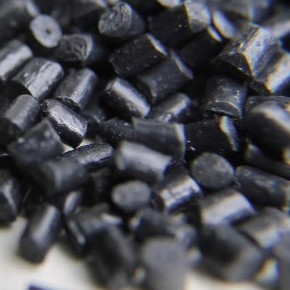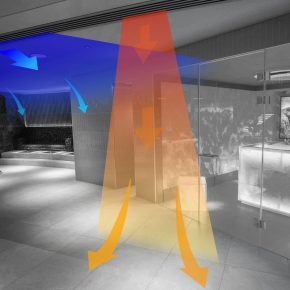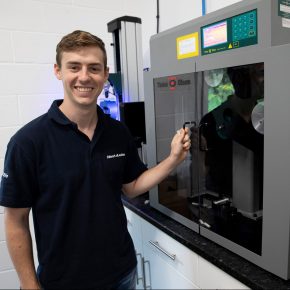
Axion: Collaborate to create end markets for recycled polymers
Collaboration between injection moulders and manufacturers, and plastic recyclers is vital to creating new end markets for recycled polymers, meet rising demand for recycled content and improve the overall economics of recycling, says Axion Polymers.
With more manufacturers, especially those in the automotive and electrical sectors, seeking to increase recycled content in new goods, the Manchester-based plastics recycler suggests this presents opportunities for injection moulders to consider alternatives to virgin material.
At Axion‘s two processing sites, plastics recovered from end-of-life vehicles (auto shredder waste) and waste electrical goods are refined into high-quality engineering polymers that match virgin material quality.
The bespoke recycled Axpoly(r) and Axplas(r) polymers can be tailored to suit clients’ specifications for use in an extensive range of new products.
The economic feasibility of recycling depends upon stable end markets, that justify the cost of processing. Moulders who work with recyclers on understanding physical polymer properties, and crucially, engage in practical trials to understand the suitability of a recycled polymer in new applications can gain a competitive advantage in emerging circular economy markets.
Ambitious aims on the recycling of packaging, and a growing desire to recycle more non-packaging products, including plastics from End of Life Vehicles and Waste Electronics and Electrical equipment, are driving manufacturers to look for new solutions and incorporate more recycled content.
Worries over a proposed tax on packaging without recycled content being possibly extended to other markets is also cited as a driver for the desire to include recycled materials in new goods.
Some closed loop recycling exists, primarily in PET and HDPE packaging. Although closed loop recycling is not pivotal, if it can be achieved it allows for the same grade of polymer to be reused in the same application – this removes some of the technical barriers of using recycled content.
However, in many cases, closed loop cannot be achieved because products may be collected in a mixed stream, where separation of different polymer grades is not technically or economically possible.
In this case, manufacturers need to consider using alternative polymer types or blends if they want to increase recycled content.
This brings a potential technical barrier.
In many cases, a moulded product is designed to use a specific grade of polymer with very specific properties. The company that produces the moulded product may not be involved in specifying the material, and so will be reluctant to use any polymer that does not conform to the exact original specification.
The potential technical barrier then becomes a ‘resistance’ to use recycled content, due to past perceptions about its ability to meet virgin material specifications and perceptions about the quality of recycled materials.
In many cases however, products do not need such rigid specifications, and in reality, a wide range of different grades of a polymer or even different blends of polymers may work well in certain applications.
Blending PE and PP from plastic film to use in injection moulding of ‘PP’ products is a prime example of what can work successfully.
Products such as crates, bins and buckets can even benefit from a PE/PP blend, as the properties can complement each other.
Axion Polymers Business Development Manager Mark Keenan says although physical properties of recycled polymers are important to measure, conducting trials using the material provides a more detailed picture.
He commented: “Moulders should work with recyclers to ensure that the recycled polymer is as suitable as possible for an application.
“At Axion Polymers, we work with our customers to get recycled content into their products or help them use a different polymer formulation altogether.
“We assist moulders at every step, right through to setting up their machinery to enable them to use alternative recycled polymers. Practical trials are the only way to truly understand the suitability of a recycled polymer.
“With the desire to recycle more and more materials, end markets need to be continuously developed. Full supply chain collaboration can ensure there are stable end markets and provide the “pull” effect to boost the overall economics of recycling.”
Twitter: @axion_group
LinkedIn: Axion Group
Contact Axion: info@axiongroup.co.uk
Visit Supplier's page
Latest news

1st April 2025
Gilberts Takes Thermal Comfort to New Heights
Gilberts Blackpool is continuing to build on its reputation as a pioneer with the unveiling of ThermaAstute™ – the most extensive range of thermally sensitive diffusers in the market.
Posted in Air Conditioning, Articles, Building Industry News, Building Products & Structures, Building Services, Facility Management & Building Services, Heating, Ventilation and Air Conditioning - HVAC, Innovations & New Products, Restoration & Refurbishment, Retrofit & Renovation, Sustainability & Energy Efficiency
1st April 2025
University of Bath Student Helps Vent-Axia Win Two Environmental Industry Awards
Leading ventilation manufacturer, Vent-Axia, is delighted that the valuable work University of Bath student Roben Els undertook during an industry placement at the company contributed to it winning two environmental industry awards.
Posted in Air Conditioning, Articles, Awards, Building Industry Events, Building Industry News, Building Products & Structures, Building Services, Heating, Ventilation and Air Conditioning - HVAC, Recruitment, Retrofit & Renovation, Sustainability & Energy Efficiency, Training
1st April 2025
Ahmarra: Fire Doors Designed for Hospitals & Healthcare Environments
Ahmarra is a leading UK specialist in fire doors for healthcare environments, having manufactured and installed thousands of bespoke doorsets for NHS hospitals across London and the South East.
Posted in Access Control & Door Entry Systems, Accessibility, Acoustics, Noise & Vibration Control, Architectural Ironmongery, Articles, Building Industry News, Building Products & Structures, Building Services, Building Systems, Doors, Facility Management & Building Services, Health & Safety, Interior Design & Construction, Interiors, Restoration & Refurbishment, Retrofit & Renovation, Security and Fire Protection, Timber Buildings and Timber Products, Wooden products
1st April 2025
Mitsubishi Electric: New intuitive, IoT-ready centralised controller offers instant access to 400 units
Mitsubishi Electric has launched a new user-friendly, touchscreen controller to offer full remote controllability, monitoring and reporting for up to 400 air conditioning units.
Posted in Air Conditioning, Articles, Building Industry News, Building Products & Structures, Building Services, Facility Management & Building Services, Heating Systems, Controls and Management, Heating, Ventilation and Air Conditioning - HVAC, Information Technology, Innovations & New Products, Pipes & Fittings, Plumbing, Posts, Research & Materials Testing, Retrofit & Renovation, Sustainability & Energy Efficiency
 Sign up:
Sign up: